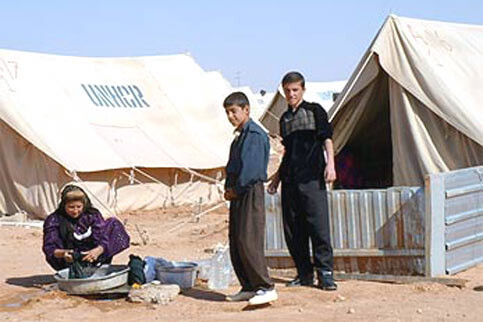United Nations High Commissioner for Refugees 24 March 2006

Refugees in the no man’s land between Iraq and Jordan are ill-equipped to cope with the approaching winter. (UNHCR/P. Kessler)
GENEVA — Panic has overtaken the Palestinian refugee community in Baghdad after more than one hundred families in the city have received death threats from groups calling them traitors.
Many of the Palestinians, who have been living for years in Baghdad, are in a state of shock and panic and are taking the intimidation very seriously, UNHCR told journalists in Geneva on Friday.
There are an estimated 34,000 Palestinians in Iraq, of whom 23,000 have been registered by UNHCR in Baghdad. The Palestinian refugees came to Iraq in three main waves - in 1948, in 1967 and in 1991. They were provided with protection and assistance by the former regime and enjoyed a relatively high standard of treatment that some segments of the Iraqi population considered unfair. As a result, the Palestinians have in the past few years faced evictions, threats and harassment.
UNHCR is increasingly concerned about the situation for these families.
“They are feeling increasingly trapped, and for security reasons many have stopped going to work and have taken their children out of school. We know very well that life for other Iraqis is very difficult as well at the moment. The Palestinians feel, however, especially vulnerable and targeted as they were perceived to have been treated favourably by the previous regime,” said Emmanuel Gignac of UNHCR’s Iraq Support Unit in Geneva.
In the wake of the deteriorating security situation, a group of 88 Palestinians were trapped in the no man’s-land between Iraq and Jordan on Sunday after fleeing the capital. These people have now been moved back inside the Iraqi border by the Iraqi authorities.
“When our colleagues spoke to some of the group they said they had no wish or intention to return anywhere in Iraq,” said Anne-Marie Deutschlander, a senior protection officer for UNHCR in Jordan. “Several of them have been very traumatised over the past weeks, with family members being kidnapped and even killed.”
“We are trying to ensure that the basic needs of the group, such as food and water are met,” added Deutschlander. “The group is, however, now in an area inside Iraq which makes it extremely difficult for us to have access or intervene.”
Late Thursday night a UNHCR team on the Jordanian side managed to get food supplies for 5-7 days, plus mattresses, blankets, kitchen sets, stoves, jerry cans and lanterns transferred to the other side of the border. “It was a very difficult undertaking, but at least the aid finally reached the people and that is the most important thing.”
Recently the High Commissioner, in a letter to Iraqi President Jalal Talibani, asked for increased physical protection for this refugee group, as well as a swift regularisation of their stay by granting them residency permits or ID documents. Under normal circumstances, this would allow this population - the majority of whom were born and have lived their entire lives in Iraq - a more reliable and confirmed legal status within Iraq. The security circumstances, however, are such that the Palestinians feel that they must flee.
“With other agencies on the ground we are very closely monitoring the situation, as we hope the panic will not spread and lead to more Palestinians leaving the capital,” said Gignac.
Related Links